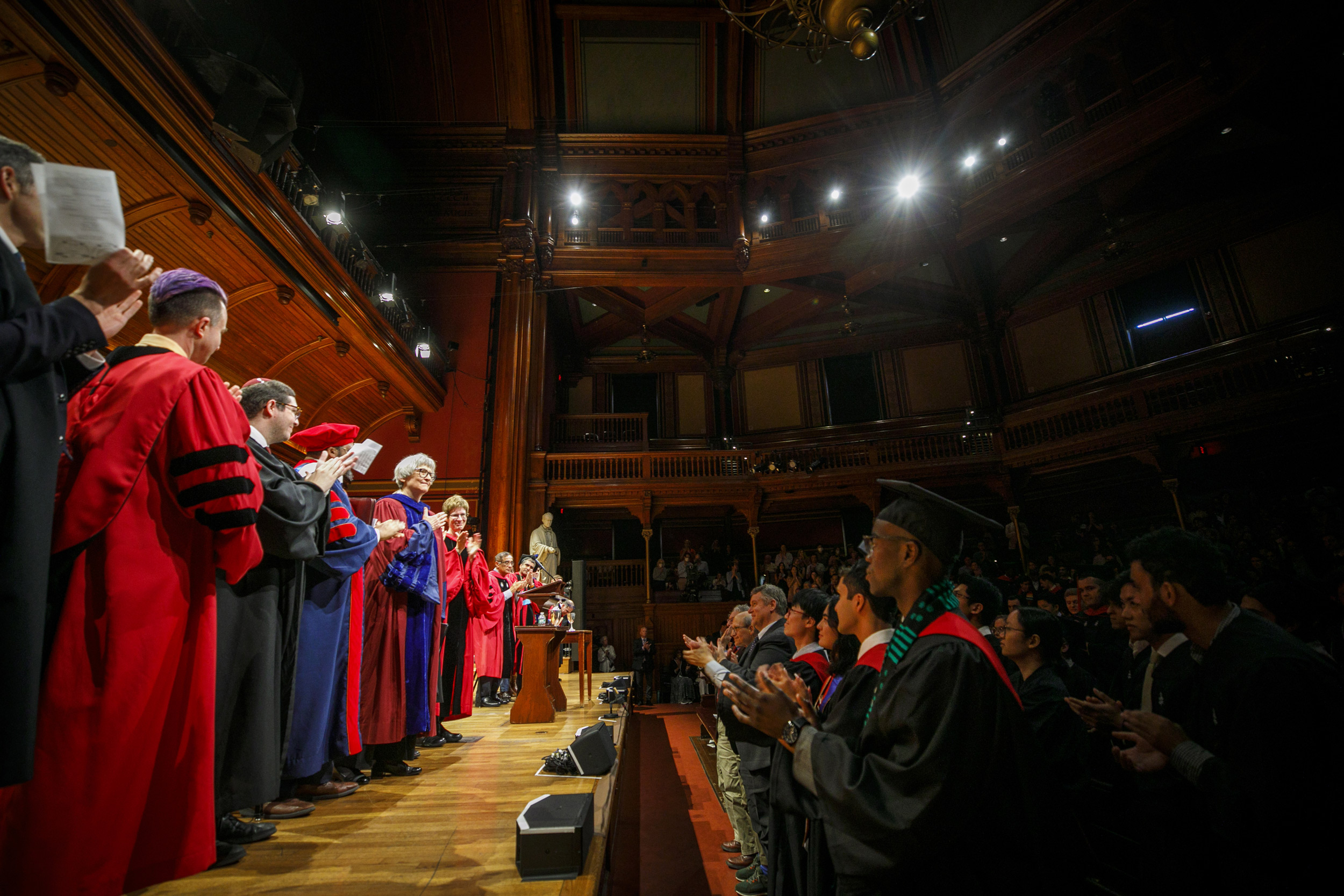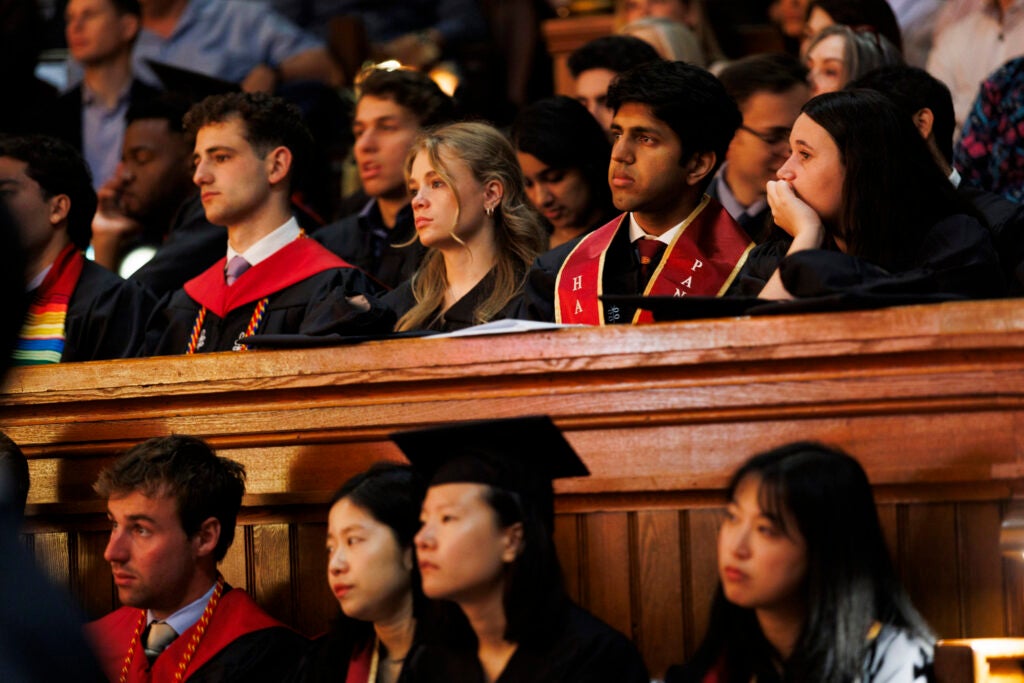
President Emerita Drew Faust (center) acknowledges the audience after receiving a standing ovation for her oration.
Photos by Stephanie Mitchell/Harvard Staff Photographer
Time to stand up, defend American higher education, Faust says
President emerita invokes spirit of Emerson, pushes back against recent criticisms
Part of the Commencement 2024 series
A collection of stories covering Harvard University’s 373rd Commencement.
President Emerita Drew Gilpin Faust invoked Ralph Waldo Emerson’s address to Harvard’s Phi Beta Kappa Society in 1837, calling on this year’s honorees to be “free and brave” scholars and defend American higher education during the PBK Literary Exercises Tuesday at Sanders Theatre.
Now considered a classic work of American letters, Emerson’s speech “The American Scholar” details the vital role of the scholar in society and is particularly relevant today as American universities are facing harsh criticisms, said Faust, the Arthur Kingsley Porter University Professor.
“I’m far from the first PBK speaker — even in recent years — to invoke Emerson and his address,” said Faust. “Many of his words about the character and duties of the scholar resonate now, long after they were first uttered. The ‘office of the scholar’ he proclaimed, is to guide others ‘by showing them the facts amidst appearances.’ A scholar he said, must not be the ‘parrot of other men’s thinking.’ A scholar, he said, must be ‘free and brave.’ As you are welcomed into the community of scholars that is Phi Beta Kappa, this is what you are asked to be.”

The exercises have been a part of Harvard Commencement since the 18th century. To be elected to the nation’s oldest academic honor society, a student needs to demonstrate outstanding academic achievement and originality, intellectual honesty, and rigor in their course of study. Undergraduates are chosen by faculty and senior staffers who are also Phi Beta Kappa members. No more than 10 percent of any graduating class can be selected. The 105 graduating seniors inducted Tuesday joined 72 members of their class elected in previous years.
In her remarks, Faust recalled that she spoke about critiques of universities in her inaugural address as president in 2007 and lamented that those in the past year have grown “deliberate” and “determined.”
“The upheavals of this past academic year arising from the tragic situation in the Middle East have provided the occasion for those already hostile to the culture of American higher education to escalate their criticism,” said Faust. “The polarizations of race, religion, and politics that grip our country have in recent months focused unceasingly on universities. One might even suggest that universities have become a primary symbol for these larger divisions, as well as the theater in which they are being acted out.
“But this is not just theater; it represents a genuine and existential threat to the foundational assumptions that have long governed American higher education.”
Partisan views about higher education are both a cause and an effect of the polarization in American society, she said, but college education benefits all.
“We must be champions of the promise and purposes of higher education — of the ‘rule of truth’ that it stands for both inside and outside these gates.”
Drew Gilpin Faust
“The lives of Republicans and Democrats alike are improved by college attendance, just as the well-being of our society as a whole is advanced by the work of free and independent universities,” she said. “The fear that higher levels of education may correlate with Democratic voting should not become a reason for advocating ignorance.”
Faust delivered an impassioned defense of universities as engines of social mobility, centers of knowledge and free speech, and entities whose purpose “transcends struggles for political power.” She lamented the influence of politics on university decisions on curriculum and faculty hiring.
“We should not be permitting, and certainly not celebrating, a governor or a legislature or a member of Congress who is designing courses or degree requirements, hiring faculty, or proudly claiming responsibility for firing university presidents,” said Faust, to resounding applause.
In closing, Faust urged students to do their part to stand firm in their support for the nation’s universities.
“American higher education is endangered,” she said. “We who have been nurtured and shaped by universities; we who proudly embrace our identities as scholars ‘free and brave’ must acknowledge, to borrow from that early PBK oration, both the ‘dangers’ and the ‘duties’ that lie ahead. We must be champions of the promise and purposes of higher education — of the ‘rule of truth’ that it stands for both inside and outside these gates.”
Yesterday’s ceremonies also featured a reading by Pulitzer Prize-winning poet Tracy K. Smith, professor of English and of African and African American Studies. She offered two poems, including one she wrote for the occasion.
In addition, three members of the Faculty of Arts and Sciences were honored for teaching excellence: Andrew Davies, assistant professor of organismic and evolutionary biology, for his “unparalleled dedication to undergraduate research”; Gage Hills, assistant professor of electrical engineering, for his “accessible, engaging, and inclusive” teaching style that “makes learning about circuits truly electrifying”; and Sheila Jasanoff, Pforzheimer Professor of Science and Technology Studies at the Harvard Kennedy School, for her “extraordinary dedication to teaching undergraduates” and for “exemplifying an ethical stance that educating students is just as much an opportunity to learn with and from them.”
Get the best of the Gazette delivered to your inbox
By subscribing to this newsletter you’re agreeing to our privacy policy







